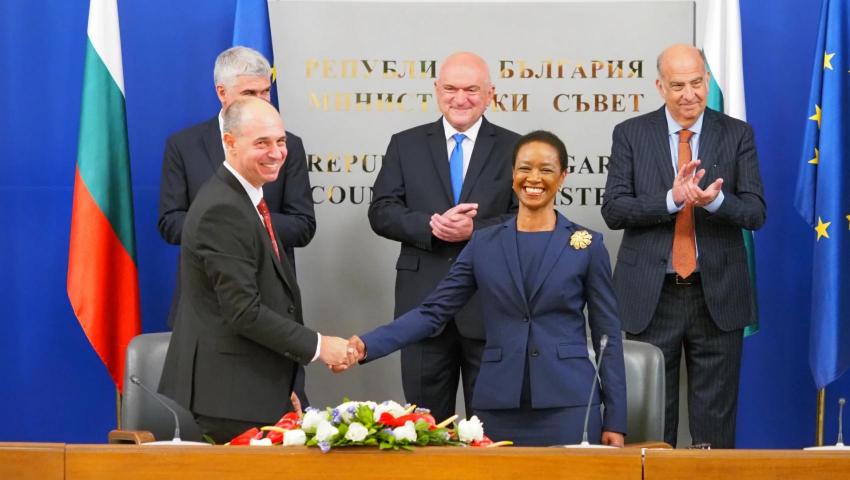ESO attracts investment of over 1,500,000 USD for the feasibility study of the East-West Energy Corridor

The directors of the Electricity System Operator of Bulgaria Angelin Tsachev and the United States Trade and Development Agency (USTDA) Eno Ebong signed an agreement for free financing of the activities on the feasibility study of the East-West energy corridor at a special ceremony in the Granite Hall of the Council of Ministers.
The grant from the US Trade and Development Agency will finance the studies of the project initiated by the Electricity System Operator of Bulgaria to build a new energy corridor to connect the electricity transmission networks of Bulgaria, Greece, Turkey, North Macedonia, Kosovo, Albania and Montenegro, with the possibility of reaching Italy.
"I am grateful for the active cooperation in recent months between ESA and the United States Trade and Development Agency, which led to today's signing of the grant agreement for the feasibility study of the East-West Energy Corridor," said the Executive Director of the Electricity System Operator Angelin Tsachev. "The implementation of the project is of key importance for achieving the goals of decarbonization and increasing the cross-border capacity of the grid for the transmission of electricity produced from renewable energy sources. The meetings held with the electricity transmission operators of Turkey, Greece, North Macedonia, Serbia, Kosovo, Albania and Montenegro confirmed the viability of the project", stressed the executive director of ESO.
"Partnering with ESA will support Bulgaria's renewable energy and climate ambitions, and will bring benefits to the whole of Europe," said the Executive Director of the US Trade and Development Agency, USTDA, Eno Ebong. "By leveraging American technology, this USTDA commitment will support Bulgaria's goals to decarbonize the energy sector and provide additional cross-border transmission capacity for electricity generated from renewable energy sources."
The ceremony of signing the agreement was attended by the Prime Minister of the Republic of Bulgaria Dimitar Glavchev, the Ambassador of the United States of America to our country H.E. Kenneth Merten and the Minister of Energy Vladimir Malinov.
"In the person of USTDA, we have a reliable and full-fledged partner, whose expertise and professionalism are an indisputable capital for the development of the Bulgarian energy industry," stated Minister Vladimir Malinov and added: "With this project, we achieve a solution to the energy security not only of Bulgaria, but also of the entire region. This is another key step in the process of transforming our energy towards a better future, as well as an opportunity to exchange electricity between countries in the region, in real time, which will allow the stabilization of electricity markets and the achievement of a price that is acceptable for both businesses and households."
The Prime Minister of the Republic of Bulgaria Dimitar Glavchev said: "It is my pleasure to participate in today's ceremony, which marks the successful partnership between the United States Trade and Development Agency (USTDA) and ESO EAD. For our country, this cooperation is key from the point of view of fulfilling the priorities in the energy sphere and the successful implementation of the green transformation. This will enable the efficient utilization of green energy produced in the region and will contribute to the successful implementation of our priorities related to the decarbonization of the economy."
The pre-project study will make an economic and technical analysis of the need to develop the electricity transmission network and increase the cross-border capacity by 2000 MW each on the borders of Bulgaria with Romania, Greece, Turkey and North Macedonia for the effective utilization of the green energy produced in these countries. The analyzes of the study will also assess the plans for the construction of two new PSHP on the "Batak" and "Dospat" dams and their connection to the electricity transmission network of Bulgaria. The aim of the East-West Energy Corridor project is to improve cross-border transmission capacity and the network's ability to exchange real-time electricity produced from renewable sources in the region. The implementation of the project will contribute to the improvement of the electricity transmission infrastructure and energy security in the countries of South-Eastern Europe.
